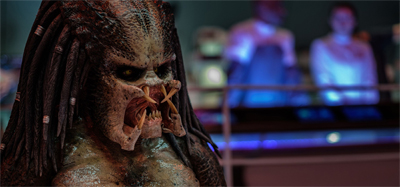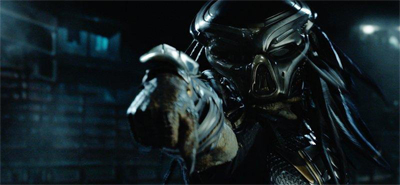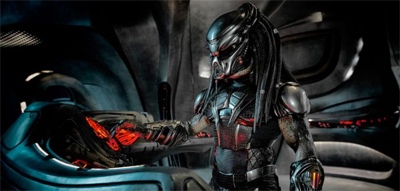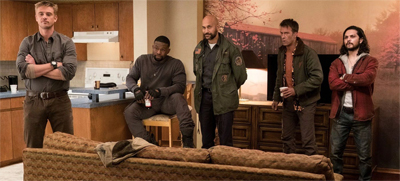The Predator adopts the as-ambitious-as-it-is-counter-productive of smirkingly mocking big budget franchise films while also actually being a big budget franchise film.
Shane Black’s sequel to the beloved eighties actioner is jarring, caught between two masters. On the one hand, Black writes the characters in his patented self-ware style, with banter and wry liners to beat the band. However, these characters are then dropped right into the middle of a fairly brain-dead paint-by-numbers action film that is clearly structured to feel like a contemporary franchise foundation stone. There is a constant push-and-pull between these two extremes, which is disorienting and distracting.

The Predator took the reviews rather well.
The Predator never seems sure whether it is a good old-fashioned fun-dumb blockbuster mocking the pretensions of modern franchise films or alternatively a smart self-aware action comedy picking at the tropes of fun dumb action films. It’s never entirely clear whether the issues with The Predator are playful self-parody or just terrible plotting; whether Shane Black is not taking any of this seriously or whether he is taking all of it much too seriously.
Whenever The Predator seems to be working, it veers too sharply one way or the other and the audience gets whiplash.

Pred-locks.
Shane Black’s reputation as a film-maker is built upon his trademark bittersweet juxtaposition of provocative profanity with an underlying compassion. Black’s characters are often very crude and very blunt, but there’s a strange humanity to be found in their roughness. This dates back to his work as a writer on films like Lethal Weapon or The Long Kiss Goodnight, but it is even more apparent in his work as a director on films like Kiss Kiss, Bang Bang and The Nice Guys.
The issue is that this juxtaposition doesn’t cleanly integrate with the demands of studio franchise blockbuster-ing. Modern franchise-building (alas) demands a certain po-facedness that jars with Black’s approach. There is a demand that everything be taken seriously and treated with the necessary respect, that the characters and the continuity be venerated and enshrined, and that any attempt to pick at the elements of some long-running geek-friendly franchise should be treated as an act of unparalleled aggression.

Something to sink it’s teeth into.
Shane Black’s last flirtation with modern blockbuster film-making, Iron Man 3, toned down that po-faced self-seriousness for knowing irony. The film openly mocked the outdated racist concept of the Mandarin as a major antagonist for Tony Stark. That flippant approach is one of the reasons that that the film remains so divisive, particularly among more militant comic book movie fans who feel betrayed by it. Maybe it’s no surprise that The Predator takes its concept much more seriously than Black’s last foray as writer/director on a mega-franchise film, and is the worse for that.
In terms of demonstrating how seriously The Predator takes its franchise-building preoccupations, this is a film that awkwardly provides a world-building reason why the creatures collect the spines of their victims. This exposition is delivered with very earnest sincerity by characters wearing lab coats and collecting vials of samples. The sequence is absolutely ridiculous, but there’s a weird tension in the film as the audience tries to determine precisely how seriously Black himself is taking all of this.

The spine of the series.
After all, Predator very effectively explained to audiences why the eponymous creatures ripped out the spine of their prey. Ripping a victim’s spine out just looks cool, especially by the standards of eighties hyper-violent action movies. More than that, these are hunters who are taking trophies. Predator explained all of this in a handful of thirty-second dialogue-lite vignettes with the creature. The Predator has to scientists and analysts arguing about it, insisting that there must be a bigger reason for this.
This is the sort of reverse-engineered internal logic that has become a staple of modern franchise film-making, where absolutely every aspect of a character or concept needs to be given a higher purpose within the context of the narrative. “It looks cool” is no longer justification for this sort of detail in franchise film-making, because that might suggest that these films are a shallow pleasure, and not worthy of intellectual or critical rigour. There is a weird insecurity running through these nostalgic properties, a demand that they be taken seriously.

Dangling plot threads…
The Predator very much takes itself seriously. The Predator creates an in-universe justification for the (relative) explosion of Predator movies in recent years from the perspective of the protagonists. Of course, the audience knows why visits from from these aliens have become more frequent in the world of the film; the studios have been producing more sequels at a much greater pace. If the characters within the film are noting more of these aliens arriving, it is simply because the audience has been watching more Predator films. It is not difficult. It is not illogical. It is not a plot hole.
However, the sort of self-serious franchise-film-making that drives so much of The Predator demands an entire elaborate in-universe justification for this trend. To satisfy that demand, The Predator includes an exposition-driven scene between Sterling L. Brown and Olivia Munn, in which the characters argue that global warming causes Predators. It is a particularly surreal scene because it arrives with no context and positioned very strangely within the narrative of the film.

Needs a shot from the arm.
The plot itself is pure over-plotted nonsense. The basic concept of Predator should be very obvious; a bunch of intergalactic big game hunters target a bunch of human protagonists, who try to survive the hunt. Instead, The Predator decides to engage some “intergalactic cops-n-robbers bullsh!t” that hints at absurdly over-complicated ideas like a civil war among the aliens, or that there might be good aliens actively helping humanity for reasons that are obscure, or that the creatures are involved in complicated genetic engineering plots with a long-term objective on Earth.
However, this over-complicated plot is somewhat muddied by the difficulty that the film has in keeping details straight from one scene to the next. At the climax, a heroic character literally appears out of nowhere, apparently having managed to keep pace with a space ship on foot so that they might have a “big damn heroes” moment in which they save the protagonist. At another point, the film cuts from a character destroying a phone with information that the government wants to exposition explaining that she has given them all of that information anyway.

Una-Boyd-able.
Poe’s law comes into effect here. This kind of reverse-engineered over-complicated mythology-building makes it seem like The Predator is parodying modern franchises. There’s no way the film is asking audiences to take any of this seriously, right? This is all an elaborate joke, surely? It’s a knowing and smirking punchline about the worst impulses of modern franchise film-making, which clutters enjoyable and thrilling action movies with over-earnest dead-end explanations of things that don’t need to be explained in order to reassure viewers that this all makes sense.
There are other aspects of The Predator that thread this line. The Predator is saturated with over-obvious mythology references and callbacks, which are glaring and distracting. Jake Busey shows up as a character who is clearly meant to be the son of Gary Busey’s character from Predator 2. The film includes Alan Silvestri’s iconic score at every opportunity, often coupled with the shots of helicopters that are a huge part of the film’s aesthetic. There’s an ironic use of the line, “Get to the choppers!”
However, the most striking example might be the film’s climax, in which Black resolves the over-complicated race-to-the-macguffin plot with a Mexican stand-off involving the government agents and the heroic misfits, only to suddenly shift back to the obligatory and familiar “the Predator hunts the protagonists through a bunch of trees” climax that seems to only exist because it is the kind of climax that everybody expects from a Predator film. It is an obligation, so it gets crammed in right at the end. More than that, it becomes gratuitous and over-extended.
On an even more basic level than that, there’s something awkward in how readily The Predator makes the Predator a known quantity. Not only do characters casually use “Predator” as a proper noun, they also discuss the application of that descriptor to the creature. When Will Traeger explains their methodology to Casey Bracket, she explains that the name is nonsensical. She suggests they are more like a big game hunter or a trout fisherman. “We had a vote,” Traeger counters. “Predator sounds cooler.” This is not the only time the discussion is had.

Another day at the office.
More than that, there’s nothing novel or exciting about the appearance of the creature to any of the characters in The Predator. Everybody adapts to it quite quickly, embracing the reality that they’re in a science-fiction film with a minimum of wonder or awe. It feels like The Predator unfolds in a world where rooms full of people in suits and ties have spent decades preparing very boring papers on these badass alien big game hunters. Again, it’s hard to judge how self-aware Black was in writing this, because it feels almost like a commentary on franchise film-making.
The Predator feels too routine, too familiar, too safe. It allows the audience too much access to the aliens. Repeatedly over the course of the film, the audience is allowed to understand what the aliens want, their dialogue translated into subtitles. At various points in the narrative, the aliens actually communicate with the humans, delivering clear ultimatums and demands. What was once unknowable and mysterious is now mundane and straightforward. Once again, Black feels like he’s franchising so hard the movie might break.

Keep on trucking.
All this earnest (and frankly rote) franchising jars very much with Black’s more self-aware and playful tendencies, such as populating The Predator with characters who seem to have seen at least one movie like Predator and understand its mechanics. The characters seem smarter than the film in which they find themselves, which makes it seem like Black is openly mocking the film that he is making. “Welcome to Therapy Group II,” states the hero at one point, wryly. “The sequel to Therapy Group I, only dumber.”
To be fair to The Predator, there are moments when it gets close to working. Ironically, these moments have the least to do with the eponymous and iconic movie monster. The Predator is at its best when it focuses instead on the human cast. Black has populated the film with a bunch of likable actors and his script affords them endearing and engaging personalities in that way that old-fashioned eighties action movies used to characterise people. (In that each character has a particular trauma, a unique mannerism, and maybe a distinct accent.)

The not-so-Nice-Guys.
The ensemble is great and there’s a sense that the characters are more engaging than the movie in which they find themselves. Black populates The Predator with a large group of his smart-asses-who-aren’t-actually smart, who frequently contradict one another and who nitpick the conventions and the expectations of the stories in which they find themselves, while still filling the necessary and formulaic roles within that story.
For example, Sterling K. Brown’s human baddie is an exemplar of a stock archetype. His sleazy and aggravated government operator is very clearly modeled on the role that Gary Busey played in Predator 2, but is much more engaging and compelling. There’s absolutely nothing original about the character – right down to the way he’s introduced shoveling nicotine pills into his mouth to explain why he’s so agitated all the time – but he provides a fun archetype to bounce ideas (and other characters) off.

Hunting season.
The Predator returns to Shane Black’s preoccupation with psychological damage that can be traced all the way back to his work on Lethal Weapon. The heroes of the film are a group of former soldiers working through psychiatric issues. The treatment of these issues is as delicate at one might image from Black – the group call themselves “The Loonies”, and there’s one joke about the use of inappropriate language about mental disability that features a character unthinkingly using that language while also chastising it.
However, despite (or perhaps even because of) this playful and knowing lack of delicacy, there are moments of genuine warmth and humanity between this band of misfits. Black has a knack for exploring the vulnerability of foul-mouth tough-guy protagonists that gets under their skin, contrasting his very broad treatment of very real issues with a surprising compassion. In particular, there are moments between Thomas Jane and Keegan Michael Thomas that are both shockingly tone-deaf and weirdly affecting.

“I’ll be tobacco.”
However, all of these successes are qualified by other decisions. Much of the movie hinges on Rory McKenna, the young child of the protagonist who lives with autism. There is the potential for an off-kilter and strangely-touching narrative about familial connection here. “I’m sorry I didn’t turn out the way you wanted,” Rory tells his father at one point, a sweet sentiment juxtaposed by his father’s bloodthirsty violent tendencies. However, any hint of nuance is lost when The Predator transforms Rory’s condition into a crass and ill-judged plot point.
It doesn’t help matters that The Predator is coloured by events outside of its own narrative. The film attracted headlines when Olivia Munn objected to working with a convicted child sex offender, and his scene was promptly cut from the film. However, Munn has since talked about feeling isolated and marginalised as a result of that decision. The studio (and the cast’s) response to all of this feels decidedly ill-considered.

Considering it on a Casey-by-Casey basis.
While the studio cut the offending scene, there are still some puzzling inclusions, such as the moment in which Munn’s character meets the villain. He loudly boasts, “Would you like to meet a predator?” It seems a very ill-judged retention when directed at the only member of the primary cast who shared a scene with the sex offender. Similarly, a sequence in which Munn cowers (naked) from the eponymous alien plays a lot more awkwardly in light of the background information.
The Predator is a mess. It is occasionally fun, but always veering too far in one direction or another. It’s too dumb to be an enjoyable self-aware action movie, but too insistent on its own intelligence to work as a big dumb blockbuster.
Filed under: Non-Review Reviews | Tagged: film, franchise, Movie, mythology, non-review review, predators, review, Shane Black, the predator |




















I always thought the Predator sequels were the ultimate case of flanderizing an alien race by assigning to it the traits we’d seen in the first character or two onscreen. “Predator” is about an alien big game hunter on safari on Earth. Therefore, he must be the product of an entire race that revolves entirely around hunting. And they must be tied to Earth in some deep and meaningful and civilization-defining way.
Pity what you say about Shane Black. I think it was Ebert who ridiculed an attempted Lethal Weapon parody by asking how you could possibly “parody” a movie with an exploding toilet. Could have used some of that.
Yep. I think it’s also largely a result of the need to develop a mythology beyond the so-straightforward-how-do-you-mess-it-up premise of – as you described – “an alien big game hunter on safari on Earth.” There’s no need to amplify the scale of the premise, as the premise is robust enough to work as is.
So much of that first movie depends on the unspoken notion that the alien might as well be a person, that there was no need for it to come from an entire world that acted exactly like it—the idea that it didn’t put its weapons down for the same reason the mercenaries didn’t put theirs down, not because they didn’t see that as a viable option, not because they were incapable of it or because it was in their blood, but because they all chose to be there, in the jungle, and that wasn’t what they came there to do.
Yep. It’s the Flanderisation of “the Predator” from a single alien to an entire species. For all we know in the original, it could be an extraterrestrial version of “Hostel.”
This is an excellent review that contains some interesting and salient points.
I thought The Predator was a tedious, tone deaf and persistently erratic revival of the B-movie franchise. You can find out more in my review below:
If you find the piece to your liking, then please comment and follow.
Thanks Sartaj!